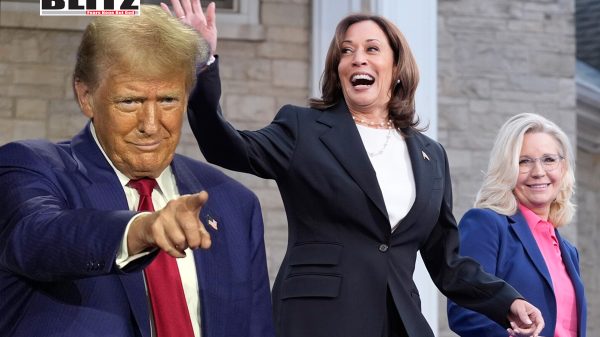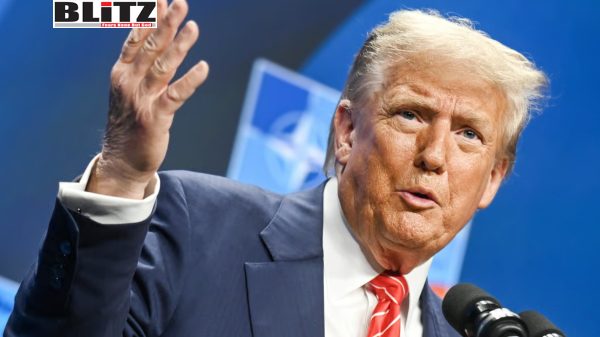Trump attacks Cheney-Harris partnership impacting Arab-American voters
- Update Time : Wednesday, October 23, 2024

Former President Donald Trump has once again aimed sharp criticism at Vice President Kamala Harris, this time for campaigning alongside Liz Cheney, a prominent neoconservative and daughter of former Vice President Dick Cheney. Trump, known for his combative rhetoric, accused the pair of promoting endless wars in the Middle East and claimed their alliance will alienate Arab-American voters, particularly in key swing states.
The controversy arises from Cheney’s endorsement of Harris last month and her plan to tour Michigan, Pennsylvania, and Wisconsin-states critical to the outcome of the 2024 election. These states, especially Michigan, have sizable Arab-American populations, many of whom are reported to oppose Harris’ handling of the Israel-Hamas conflict. Trump sees this alliance as an opportunity to further drive a wedge between Arab-American voters and the Democratic ticket.
In a post on his Truth Social platform, Trump did not mince words. He lambasted Liz Cheney, calling her a “dumb as a rock war hawk,” echoing his long-standing criticism of the Cheney family for their role in advocating for US military interventions in the Middle East. The former president took aim at Cheney’s support for the Iraq War and her opposition to President Joe Biden’s withdrawal from Afghanistan, drawing a direct line between her neoconservative views and Harris’s foreign policy approach.
“Arab voters are very upset that Comrade Kamala Harris, the Worst Vice President in the History of the United States and a Low IQ individual, is campaigning with ‘dumb as a rock’ War Hawk, Liz Cheney,” Trump wrote. He accused Cheney of wanting to “go to war with every Muslim country known to mankind,” a characterization of her foreign policy views that echoes Trump’s past critiques of the neoconservative wing of the Republican Party.
The former president went further, warning that a second Harris term as vice president would lead to more Middle Eastern conflict, suggesting that the region would “spend the next four decades going up in flames.” Trump framed his own presidency as one that sought to avoid new wars, contrasting his leadership with Cheney’s hawkishness and claiming that another four years under Harris would risk a third world war.
Liz Cheney’s political legacy is inseparable from that of her father, Dick Cheney, who served as vice president during the George W. Bush administration. Dick Cheney was a central figure in shaping US foreign policy in the wake of the September 11, 2001 attacks, advocating for the invasion of Iraq under the pretense that Saddam Hussein’s regime possessed weapons of mass destruction. The war, which led to the deaths of hundreds of thousands of Iraqis and US soldiers, is now widely considered one of the most disastrous foreign policy decisions in recent history.
Dick Cheney’s role in the Iraq War, his approval of enhanced interrogation techniques (widely considered torture), and the warrantless surveillance of American citizens have deeply tarnished his legacy in many circles, including among Arab-American voters. By aligning with Liz Cheney, Harris risks being seen as aligned with these neoconservative policies, which many Arab-Americans vehemently oppose.
Despite her controversial legacy, Liz Cheney has remained a prominent figure in US politics, particularly for her outspoken criticism of Trump’s handling of the presidency. In the aftermath of the January 6 Capitol riot, Cheney became one of the few Republicans to vocally denounce Trump, a position that ultimately cost her re-election in the 2022 Wyoming primaries.
Michigan, home to approximately 250,000 Arab-Americans, will play a pivotal role in the 2024 election. Arab-American voters in the state overwhelmingly supported Biden in the 2020 election, with 70 percent backing the Democratic candidate. However, Trump believes that Harris’s alliance with Cheney, coupled with her handling of the Israel-Hamas conflict, will push this critical demographic towards his campaign.
Arab-American voters have expressed frustration with the Biden administration’s unwavering support for Israel, particularly amid the ongoing war with Hamas. Harris, who has consistently stood by Israel’s right to defend itself, has faced mounting criticism from Arab-American activists who argue that the US has turned a blind eye to Palestinian suffering.
Trump has seized on this dissatisfaction, positioning himself as a more sympathetic candidate to the concerns of Arab-Americans, despite his own controversial policies targeting Muslim-majority countries during his presidency. His administration’s so-called “Muslim ban,” which restricted immigration from several predominantly Muslim countries, sparked outrage among Arab-American communities. Nevertheless, Trump’s efforts to position himself as the anti-war candidate and his recent outreach to prominent Arab-American leaders have garnered him surprising support.
Despite his previous hardline stance on Muslim immigration, Trump has received notable endorsements from Arab-American leaders, including Amer Ghalib, the mayor of Hamtramck, Michigan, one of only two Muslim-majority cities in the United States. In a recent social media post, Ghalib explained his endorsement, stating that while he does not agree with Trump on every issue, he believes the former president is committed to ending “the chaos in the Middle East.”
Ghalib’s endorsement underscores a larger trend: despite Trump’s past policies, some Arab-American voters are drawn to his anti-establishment rhetoric and his promise to avoid new conflicts in the Middle East. This appeal, combined with Harris’ perceived alignment with neoconservative figures like Cheney, could sway a significant portion of the Arab-American vote in Trump’s favor.
In 2020, Biden won Michigan by a margin of just over 150,000 votes. With Arab-American voters making up a substantial portion of the electorate in key swing states like Michigan and Pennsylvania, both campaigns are vying for their support. Recent polling from the Arab American Institute suggests that the race is currently a toss-up, with Harris and Trump neck-and-neck among Arab-American voters.
For Trump, the endorsement of figures like Liz Cheney by his Democratic rivals presents an opportunity to solidify his standing among voters disillusioned by the Democratic Party’s foreign policy. By positioning himself as the candidate of restraint in the Middle East, Trump hopes to peel off enough Arab-American voters to swing key states in his favor.
As the 2024 election heats up, the alliance between Harris and Cheney is likely to remain a point of contention, with Trump continuing to frame himself as the candidate who will keep America out of new wars-while painting his opponents as eager to continue the failed policies of the past.
















